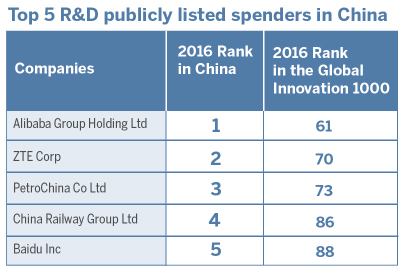


Research and development spending growth by Chinese companies leads the global market as they shift their advantage from competitive costs to innovation to build up technology capabilities to win in the global market, according to research.
The 2016 Global Innovation 1000 Study from Strategy&, which identified the 1,000 public companies around the world that spent the most on R&D during the last fiscal year as of June 30, said that 130 Chinese companies among the top 1,000 spenders on R&D had spent a combined $46.8 billion on R&D, up 18.6 percent from $39.4 billion in last year.
As a result, the R&D spending contributed by Chinese companies is also on the rise, up from 5.8 percent in 2015 to 6.9 percent in 2016.
Huawei, a Chinese leader in telecommunication, although being excluded from the top spenders list due to its nonpublic status, is highlighted as the highest spender on R&D in China with 59.6 billion ($9.48 billion) on R&D in 2015, the ninth largest R&D spender behind Novartis but ahead of Johnson & Johnson among the top 1,000 global innovation enterprises.
"In light of the innovation-driven development strategy at a national level, Chinese companies have been increasing their investment in R&D year by year," said Adam Xu, partner and leader of digital practice with Strategy&.
Many of world's major innovators are transforming mostly driven by changing and rising customer expectations, and the fast pace of improvement in what software can do, including the increasing use of embedded software and sensors in products.
"Companies will recruit fewer mechanical engineers and more data and software engineers to build their capabilities, shifting from physical products to digital offerings including software and services," said Huw Andrews, partner and innovation group leader of PwC China.
Chinese companies have been allocating a great deal of R&D resources on optimizing production processes and the supply chain, which help to reduce costs and increase productivity, which are not directly visible to consumers but benefit companies, said Andrews.
 Fire brigade in Shanghai holds group wedding
Fire brigade in Shanghai holds group wedding Tourists enjoy ice sculptures in Datan Town, north China
Tourists enjoy ice sculptures in Datan Town, north China Sunset scenery of Dayan Pagoda in Xi'an
Sunset scenery of Dayan Pagoda in Xi'an Tourists have fun at scenic spot in Nanlong Town, NW China
Tourists have fun at scenic spot in Nanlong Town, NW China Harbin attracts tourists by making best use of ice in winter
Harbin attracts tourists by making best use of ice in winter In pics: FIS Alpine Ski Women's World Cup Slalom
In pics: FIS Alpine Ski Women's World Cup Slalom Black-necked cranes rest at reservoir in Lhunzhub County, Lhasa
Black-necked cranes rest at reservoir in Lhunzhub County, Lhasa China's FAST telescope will be available to foreign scientists in April
China's FAST telescope will be available to foreign scientists in April "She power" plays indispensable role in poverty alleviation
"She power" plays indispensable role in poverty alleviation Top 10 world news events of People's Daily in 2020
Top 10 world news events of People's Daily in 2020 Top 10 China news events of People's Daily in 2020
Top 10 China news events of People's Daily in 2020 Top 10 media buzzwords of 2020
Top 10 media buzzwords of 2020 Year-ender:10 major tourism stories of 2020
Year-ender:10 major tourism stories of 2020 No interference in Venezuelan issues
No interference in Venezuelan issues
 Biz prepares for trade spat
Biz prepares for trade spat
 Broadcasting Continent
Broadcasting Continent Australia wins Chinese CEOs as US loses
Australia wins Chinese CEOs as US loses